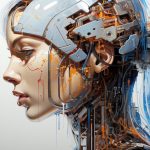Personalized Healthcare: Wearables, Telemedicine, and AI Diagnostics
3. AI Diagnostics: Precision and Speed
Artificial Intelligence (AI) is revolutionizing the field of medical diagnostics. With the ability to analyze vast amounts of data quickly, AI algorithms can assist doctors in diagnosing diseases with greater accuracy. For instance, AI-powered tools can analyze medical images, such as X-rays or MRIs, to detect anomalies that might be missed by the human eye.
In addition to imaging, AI is being used to predict patient deterioration, optimize treatment plans, and even assist in drug discovery. The precision and speed offered by AI diagnostics can lead to faster treatment initiation, improving patient outcomes. As AI models continue to learn and improve, their potential in enhancing diagnostic accuracy and treatment efficacy is boundless.
4. Personalized Treatment Plans
With the integration of genomics and advanced data analytics, healthcare professionals can now develop treatment plans tailored to individual patients. By understanding a patient’s genetic makeup, doctors can predict how they might respond to certain medications or treatments. This personalized approach reduces the trial-and-error method traditionally associated with treatments, leading to more effective care and reduced side effects.



